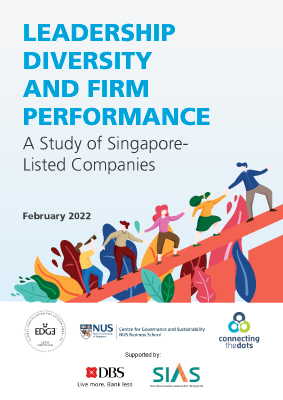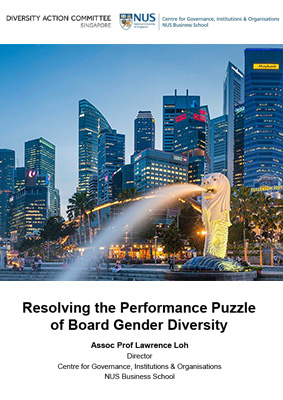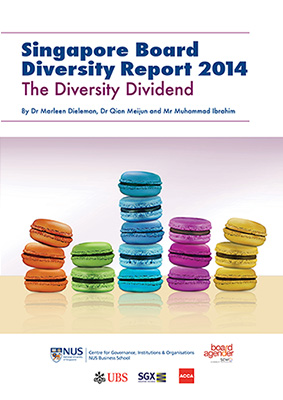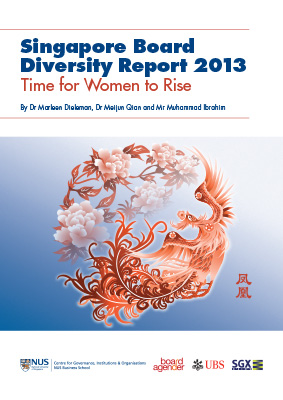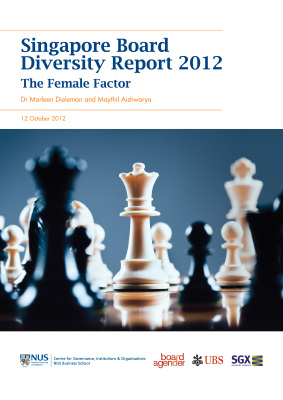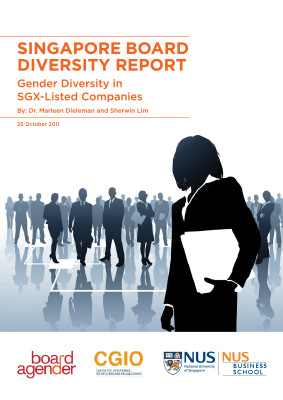Leadership Diversity
CGS’s research on leadership diversity in Singapore and Asia Pacific region spans over a decade. Our research reports and academic journals provide a rich resource of information and data on the trends, evolution and state of leadership diversity since 2011.
Leadership Diversity and Firm Performance: A Study of Singapore-Listed Companies
Leadership diversity encompasses not only diversity at the gender level but also age, educational qualifications, and industry experience. A diverse board is perceived to be fair-minded, transparent, forward-looking, and able to take on new challenges with the rich diversity of perspectives and experiences its members bring. This aspect is particularly important with the increasing realisation that ‘continual disruption’ is the new business norm.
A new study by the Centre for Governance and Sustainability (CGS) of NUS Business School aims to examine the influence of leadership diversity in terms of age, gender, educational qualifications and industry experience on firm performance. CGS hopes to contribute to developing diversity policies and practices in companies and organisations.
The research finds several interesting relationships between the proportion of each diversity attribute and its effect on firm performance. Another unique factor in this study is the concept of gender parity point and the use of this feature in statistical analysis.
The study is sponsored by DBS, EDGE Strategy, and the Securities Investors Association (Singapore) (SIAS).
Board Diversity and Business Performance in Singapore-Listed Companies: The Role of Corporate Governance
Using econometric techniques, CGS conducted a study that established a link between board gender diversity and company’s financial performance, acting through corporate governance. This is a necessary condition towards establishing a definitive causality between these two aspects.
This study is important as there has been much debate and scepticism on whether board gender diversity has positive impact on a company’s financial performance. While there were some consulting and corporate studies that point to favourable impacts, it does not help that the stream of academic studies generally showed non-existent or very weakly positive effects.
Associate Professor Lawrence Loh, Director of CGS, NUS Business School, said, “Up to now, studies across the world have found that the impact of board gender diversity on financial performance is either non-existent or weakly positive. Through econometric techniques, our study is the first in the Singapore context to establish that such a relationship exists through corporate governance.”
The results were announced at a seminar “Resolving the Performance Puzzle of Board Gender Diversity” organised by the Diversity Action Committee (DAC) on 29 June 2018. The presentation slides can be accessed here.
More details about the event can be accessed via the 29 June 2018 event tab.
Key findings
- Board gender diversity was found to have a positive and statistically significant impact on corporate governance score.
- Corporate governance score was found to have a positive and statistically significant impact on company financial performance.
- No direct effect by board gender diversity on company financial performance was found.
- There is a positive linear relationship between the number of female independent directors and company financial performance. That is, in general, financial performance of companies with more female independent directors would be better than those with fewer or no women on the board .
Conclusion
- The findings suggest that board gender diversity has an indirect effect on financial performance, acting through its intermediate effect on corporate governance scores.
- The results infer probable causality between women on the board and corporate governance score, and as a result to financial performance. The findings are a necessary though not sufficient condition to prove causality.
- The regression study also provides a framework to make predictions about a company’s financial performance based on board gender diversity as well as other explanatory variables pertaining to board and firm characteristics.
- The effect of the fraction of female independent directors on Tobin’s Q (ratio of market value with book value), which was positive and statistically significant, would suggest that companies should pay more attention to the number of female independent directors on their boards.
1 Both return on equity (book measure) and Tobin’s Q (hybrid measure) were considered.
2 It should be noted that the sample has a maximum of three female independent directors. Thus caution must be exercised to extrapolate the relationship beyond this number.
Korn Ferry Diversity Scorecard 2016
| Presentation Slides Building Diversity in Asia Pacific Boardrooms CGIO Report – 19 April 2016 |
Asia Pacific Board Diversity Report 2016 – Building Diversity in Asia Pacific Boardrooms
The fourth edition of the Korn Ferry Diversity Scorecard series tracks board composition of companies in ten economies across Asia Pacific including Australia, China, Hong Kong, India, Indonesia, Japan, Malaysia, New Zealand, Singapore and South Korea. Click here to download the report.
This project is proudly sponsored by:

Korn Ferry Diversity Scorecard 2015
| Presentation Slides Diversity Matters: Adding Colour to boards in APAC CGIO Report – 6 March 2015 |
The 2015 report is the third in the Korn Ferry Diversity Scorecard series. The scorecard tracks the diversity performance of major economies in the Asia Pacific market, with special focus on gender representation on corporate boards. This report covers 10 economies: Australia, China, Hong Kong, India, Indonesia, Japan, Malaysia, New Zealand, Singapore, and South Korea. We selected the top 100 listed companies by market capitalisation for each country and based our study on the data contained in the companies’ annual reports for 2013.
This project is proudly sponsored by:

Singapore Board Diversity
| CGIO Report Singapore Board Diversity 2014 |
|
| CGIO Report Singapore Board Diversity 2013 |
|
| CGIO Report Singapore Board Diversity 2012 |
|
| CGIO Report Singapore Board Diversity 2011 |
The Singapore Board Diversity Report is a joint initiative of CGIO and BoardAgender an outreach arm of the Singapore Council of Women’s Organizations (SCWO) Women’s Register initiative.
This project is proudly sponsored by:




